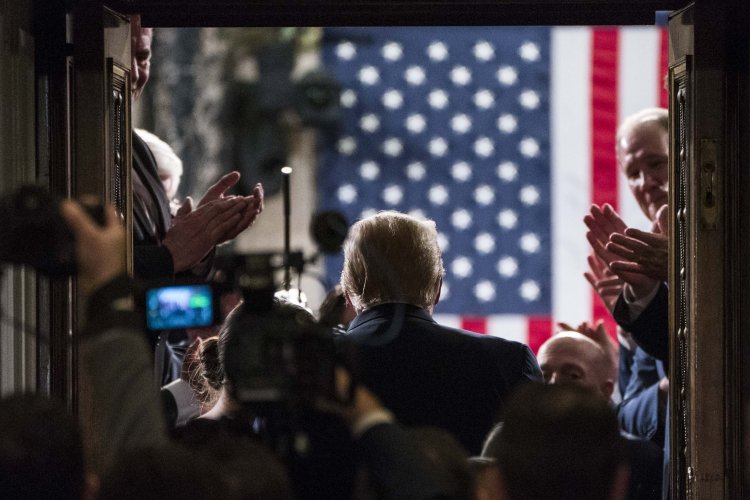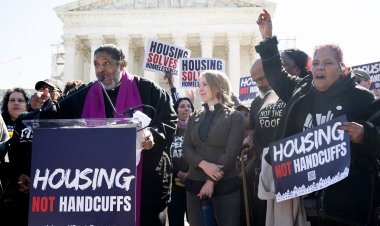House Republican Rebellion Targets Trump
The president typically overpowers dissent within his ranks. However, this time, there's a palpable sense of rebellion brewing.

Speaker Mike Johnson is confronted with the most significant internal dissent he has seen this year—one that jeopardizes his plans to push forward the Republican legislative agenda and has proven challenging enough for even President Donald Trump to manage.
Numerous House Republicans remain undecided or opposed to endorsing a Senate-approved budget blueprint for the GOP’s expansive domestic policy bill. An intensive effort from Johnson and his leadership team—including a private meeting between Trump and key dissenters—has yielded only modest progress. If they cannot sway the majority of holdouts within the next 48 hours, lawmakers will begin to depart for a two-week recess, depriving the president of a display of legislative achievements as financial markets remain tumultuous due to his tariffs.
“Why am I voting on a budget based on promises that I don’t believe are going to materialize?” one key GOP holdout, Rep. Chip Roy of Texas, said about the Senate plan.
Roy and other hard-right members have previously expressed frustrations with Johnson’s major legislative initiatives, demanding significant engagement from GOP whips and sometimes direct intervention from Trump. Past instances of rebellion have remained relatively small and manageable, but now, the opposition is consolidating, and a revolt appears imminent as deficit hawks within the Republican conference dig in, seeking substantial cuts to federal spending.
A notable change this time is the determination of some members to resist Trump's influence, who has historically intervened at critical moments to bring holdouts on board. Last month, he even threatened to support primary challengers against the one House Republican who voted against the GOP spending bill to avert a shutdown.
“I wouldn't want to be the person that stands in the way of the president's agenda,” said Rep. Lisa McClain of Michigan, the No. 4 GOP leader, in a brief interview.
Currently, however, the dissenters find strength in their numbers. The president urged House Republicans this week to “QUICKLY” approve the revised budget. When presented with his request on Tuesday, several members responded with "no."
At a White House meeting with Trump, Roy signaled his opposition to the budget plan, as confirmed by two Republicans with direct knowledge of the discussion. Another notable figure—House Freedom Caucus Chair Andy Harris—declined an invitation to the meeting, asserting that Trump was “just not going to change my mind.”
“There’s nothing that I can hear at the White House that I don’t understand about the situation,” he told reporters.
This marks a striking conclusion to Trump's dominance on Capitol Hill, where he has wielded considerable control over Republicans, even undermining a December funding deal prior to his return to the White House. Until now, the mere threat of primary challenges or political retribution was sufficient to ensure compliance among most GOP lawmakers. Yet this time, fiscal conservatives are resolute in their commitment to uphold longstanding campaign promises aimed at significantly reducing federal spending. They are also wary of potentially being overshadowed by the Senate and, to some extent, a president keen on implementing sweeping tax cuts while claiming various spending offsets.
In a social media post on Tuesday, Trump expressed his endorsement of “hopefully in excess” of $1 trillion in cuts during the White House meeting, which he characterized as a “very good meeting” with “great people.” This is a stark contrast to the $1.5 trillion to $2 trillion in spending cuts that House conservatives want to see mandated in the budget framework. He was scheduled to address additional House Republicans at a party fundraising gala later that evening.
“We've got to reduce spending to put the country on a better path fiscally,” said Rep. Lloyd Smucker, a senior Budget Committee member who is also part of the tax-writing Ways and Means Committee. “I think the disagreement is, some of us really believe that the resolution is an important foundation on which to build a good bill. And so we want to ensure that some of the principles that all of us agreed to are included.”
Rep. Scott Perry, a former chair of the House Freedom Caucus, expressed his desire for the Senate’s fiscal framework to “mirror” the House’s requirements for $2 trillion in spending cuts to offset tax reductions.
“It’s better to get it right than to get it fast,” said Perry, who participated in the meeting with Trump.
During the private gathering at the White House, Trump attempted unsuccessfully to rally Perry and other dissenters to align with him as Johnson moved towards a vote on the budget framework. However, some attendees, including Rep. Ron Estes of Kansas, indicated they were ready to support the initiative.
As the day progressed, House leaders’ schedules were slipping; they had to delay a planned Rules Committee meeting that was supposed to pave the way for a Wednesday floor vote on the proposal.
“If I were advising them, I’d tell them to wait another week,” Rep. Andy Ogles, a Freedom Caucus member, stated on Tuesday afternoon. Yet he acknowledged that extra time may not change the outcome: “You’re probably delaying the inevitable.”
In fact, the White House meeting produced little alteration in the opposition’s stance, as per another source with direct knowledge of the situation. In place of voting on the Senate-approved plan, some House hard-liners propose convening a conference with the Senate to work out a new compromise, a strategy that their colleagues across the aisle have rejected. Harris has even suggested beginning to draft the megabill and settling the budget only after Republicans are prepared to back it.
Rep. Rich McCormick, another holdout, noted he had heard from other Republicans that the White House meeting, which featured many Freedom Caucus members, had been contentious. He estimated that as many as 40 House Republicans were either opposed outright or undecided.
“We have to come to a consensus, and hopefully it'll be something that makes sense to 218 of us," McCormick added. "But until then, we don't have a lot to talk about."
Emily Johnson for TROIB News












